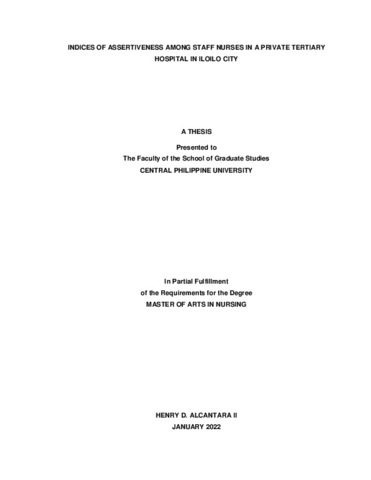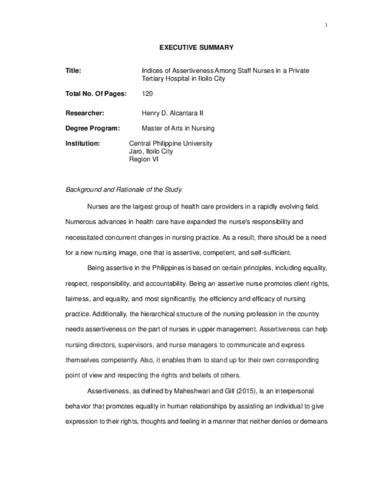Indices of assertiveness among staff nurses in a private tertiary hospital in Iloilo City
| dc.contributor.adviser | Sale, Melba | |
| dc.contributor.author | Alcantara, Henry D. II | |
| dc.coverage.spatial | Iloilo | en_US |
| dc.date.accessioned | 2022-06-20T06:48:12Z | |
| dc.date.available | 2022-06-20T06:48:12Z | |
| dc.date.issued | 2022 | |
| dc.identifier.citation | Alcantara, H. D. (2022). Indices of assertiveness among staff nurses in a private tertiary hospital in Iloilo City (Unpublished Master’s thesis). Central Philippine University, Jaro, Iloilo City. | en_US |
| dc.identifier.uri | https://hdl.handle.net/20.500.12852/2098 | |
| dc.description | Abstract only | en_US |
| dc.description.abstract | Assertiveness is essential in professional nursing practice, as nurses advocate for patients, families, and the community. This study explored assertiveness among staff nurses in a private tertiary hospital in Iloilo City. The results of this study contributed to a better understanding and awareness of the vital role of assertive behavior in therapeutic relationship development as well as boost nurses' competency in dealing with demanding and stressful work environments. Glaser's classical grounded theory approach and symbolic interactionism, the philosophical underpinnings of GT, were used to guide this qualitative research. Fifteen (15) individual and one (1) focus group interviews were conducted in a loosely structured manner with participants selected purposively from the research institution. The participant number was determined using the theoretical saturation point. The study was undertaken iteratively, with ongoing comparative analysis, in order to develop the major categories, core category, and substantive theory. Additionally, theoretical sampling was used to ensure that the generated data was saturated throughout the study. All the interviews with the participant were videotaped and transcribed and the data was analyzed without the assistance of a computer software. Importantly, the researcher took steps to assure the rigor, dependability, and integrity of the data. The findings revealed that there is context for assertiveness, as evidenced by the eight indices of assertiveness: (1) Fundamental Assertion (2) Morale-Building Assertion (3) Self-Disclosure Assertion (4) Workplace Management Assertion (5) Communication Effectiveness Assertion (6) Truth/Principle Assertion (7) Opposing Assertion and (8) Assertion for Others. Moreover, “Two Factor Theory of Assertiveness” emerged and was shaped by the broad, diverse, and vibrant experiences of the participants. This study discovered that assertiveness in the workplace occurs in three phases and is influenced by two factors: internal (values, beliefs, and personality of the nurse) and external (environment and power relations). The first phase entails the circumstances that generate the conditions for assertion, while the second phase, which involves the interaction of internal and external factors is essential in deciding the third phase's manifestation of assertiveness. | en_US |
| dc.format.extent | xiii, 120 pages | en_US |
| dc.language.iso | en | en_US |
| dc.subject.ddc | GSL Theses 610.73072 Al16 | en_US |
| dc.subject.lcsh | Assertiveness (Psychology) | en_US |
| dc.subject.lcsh | Grounded theory | en_US |
| dc.subject.lcsh | Nurses | en_US |
| dc.subject.lcsh | Philippines--Iloilo | en_US |
| dc.title | Indices of assertiveness among staff nurses in a private tertiary hospital in Iloilo City | en_US |
| dc.type | Thesis | en_US |
| dcterms.accessRights | Not publicly accessible | en_US |
| dc.description.bibliographicalreferences | Includes bibliographical references | en_US |
| dc.contributor.chair | Alibogaha, Salex E. | |
| dc.contributor.committeemember | Baldon, Charlie D. | |
| dc.contributor.committeemember | Gustilo, Alvin John H. | |
| dc.contributor.committeemember | Alba, Robyniel A. | |
| dc.contributor.committeemember | Arquiza, Glenda S. | |
| dc.contributor.department | School of Graduate Studies | en_US |
| dc.description.degree | Master of Arts in Nursing | en_US |



